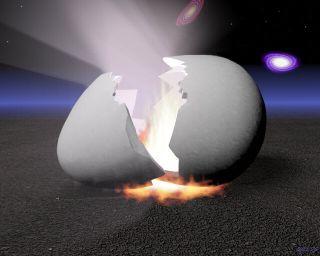'that which withers in the age of mechanical reproduction', like the shadow of natural things one finds oneself sitting under on a bright day, a thing's 'uniqueness' and that it is tied to a thing's presence.
He writes as though he is tired of what he calls a piece of art's 'aura.' It appears to be connected to a thing's untouchableness, it's specialness, it's power as an object. The further we move away from the creation of 'ritual' art objects, objects thought to hold unexplainable powers, the more they lose their 'aura' of specialness. Benjamin also seems to link 'aura' with a certain fear of an object, fear of its power or perhaps its preciousness. He seems to want to reduce art objects to mere objects, to take them off of the pedestal, as it were.
2. Benjamin could not overemphasis the effect of photography, film and reproduction on how a viewer perceives art. He states "Everyday the urge grows stronger to get hold of an object at very close range by way of its likeness, its reproduction." as though these reproductions themselves brought about an appetite to see more and closer. With film, he sees the lack of the actual actor on stage as somehow releasing the audience to any personal obligation to the actor, freeing the audience to become critics. He goes further to describe the audience's position as viewing what the camera views, as making the audience become the actual camera.
On the whole, Benjamin describes how art has become more accessible and less hierarchical, as film and photography can be viewed by so many at once. To the audience,the art has become demystified.
3. Benjamin wrote "An analysis of art in the age of mechanical reproduction must do justice to these relationships, for they lead us to an all-important insight: for the first time in world history, mechanical reproduction emancipates the work of art from its parasitical dependence on ritual." This sentence reflects Benjamin's, and the modern theorist's, dislike of privilege and hierarchy. Benjamin believed that art had preserved its association with the ritual by maintaining its role as a ritual object. As such, art had an 'aura,' a magical mystique, fear inducing and only to be handled by a limited number of people who could handle it. By making art accessible and removing the hand of the artist, Benjamin believed mechanical reproductions took art out of that sacred space and into the hands of the 'masses' in a multitude of unexpected environments.
4.This blog is changing the face of art today. Well, it could anyway. And some blogs do for a number of the same reasons Benjamin mentioned. The Internet, and Blogging are egalitarian, open to all, each voice speaking at the same volume. And they speak internationally, so it is a wider conversation. In a sense this is reproductive, as I am typing in one space, and someone is opening this page and reading it in another.
Also, in the historical world of printmaking, digital printing is still suspect. Just a few years ago at a large print conference I saw a panel discussing the ramifications of digital printing on Printmaking. Printmaking is going from (or can, if the printer chooses) elbow grease, stone wood and metal, to no-sweat, typing on a keyboard, loading paper into a printer. Lithography was one of the first industries to unionize in France, in the early 1900's, it was a working man's endeavor. This is changing due to the reproductive process of digital printing.
“Fiat ars – pereat mundus" Let art be created-Let the world perish"
http://archive.sensesofcinema.com/images/directors/05/37/borinage.jpg
Scene from Joris Iven's documentary Borinage, 1934, about a miner's strike in Belgium.
http://www.achievement.org/achievers/deh0/large/deh0-014.jpg
Mickey Rooney as Puck and Olivia de Havilland as Hermia in Max Reinhardt's 1935 film of Midsummer Night's Dream
http://igotclubfoot.files.wordpress.com/2008/12/eugene_atget_ruedeseine1934.jpg
Eugene Atget, Rue De Siene, 1934
Referred to in Walter Benjamin's "The Work of Art in the Age of Mechanical Reproduction" 1936.


No comments:
Post a Comment